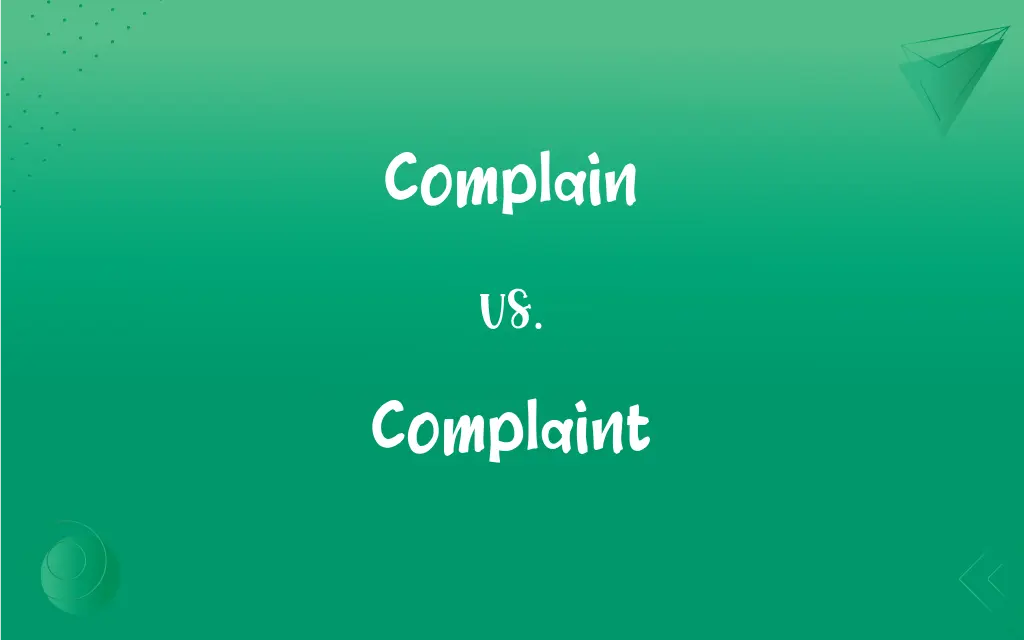Complain vs. Complaint: What's the Difference?
Edited by Janet White || By Harlon Moss || Updated on October 22, 2023
"Complain" is a verb meaning to express dissatisfaction, while "complaint" is a noun referring to a grievance or formal expression of dissatisfaction.

Key Differences
"Complain" and "complaint" are two terms closely related in meaning but differ significantly in their grammatical roles and applications. The word "complain" is a verb and pertains to the act of expressing dissatisfaction or discomfort about something. For instance, one might complain about a noisy neighborhood. In contrast, "complaint" is a noun, which represents the grievance itself or the formal expression of dissatisfaction.
When someone chooses to complain, they are engaging in the action of voicing their unhappiness or discontent. This act could be verbal or written. However, a complaint often refers to the specific issue or problem that has caused the unhappiness. It can be a formal document, like a written complaint to a company, or just the topic of one's dissatisfaction.
To provide further clarity, imagine a scenario at a restaurant. If the food is too salty, a diner might complain to the waiter. Here, the act of informing the waiter about the issue is the act of complaining. The problem with the food being too salty is the complaint.
Understanding the distinction between these two terms is vital for clear communication. Using "complain" in place of "complaint" or vice versa can lead to confusion. While both words revolve around dissatisfaction, one denotes the act of expressing it, and the other signifies the issue itself.
In daily conversations, these terms are often used interchangeably, but their correct grammatical usage can bring precision to one's expression. Whether one is choosing to complain or discussing a specific complaint, recognizing the subtle differences between these terms can enhance clarity.
ADVERTISEMENT
Comparison Chart
Part of Speech
Verb
Noun
Meaning
To express dissatisfaction
A grievance or formal expression
Example
She will complain about the noise.
She has a complaint about the noise.
Related to
Action
Issue or topic
Usage
Complain to someone
File/have/make a complaint
ADVERTISEMENT
Complain and Complaint Definitions
Complain
To voice grievances or objections.
Employees complain about the lack of proper facilities.
Complaint
A reason for being unhappy or unsatisfied.
The customer's complaint was regarding the product's durability.
Complain
To state that something is wrong or not satisfactory.
Customers often complain about poor service.
Complaint
A formal expression of dissatisfaction.
I filed a complaint with the Better Business Bureau.
Complain
To express unhappiness or discomfort.
She will complain if the room is too cold.
Complaint
A medical ailment or symptom.
He went to the doctor with a complaint of persistent headaches.
Complain
To make a formal protest.
Residents complain to the city council about the construction noise.
Complaint
A statement that something is unsatisfactory or unacceptable.
The main complaint was about the hotel's poor hygiene.
Complain
To lament or grumble about something.
Kids complain when they have to do chores.
Complaint
A grievance or cause of distress.
Tenants raised several complaints about the building's maintenance.
Complain
To express feelings of pain, dissatisfaction, or resentment.
Complaint
An expression of pain, dissatisfaction, or resentment.
FAQs
Can "complaint" refer to a medical issue?
Yes, "complaint" can refer to a medical ailment or symptom.
What is the noun form of "complain"?
The noun form of "complain" is "complaint."
Is "complain" a verb or noun?
"Complain" is a verb.
What might you do with a "complaint" in a business context?
In a business context, you might file or address a complaint.
Is "complain" always used in a negative context?
Mostly, yes. "Complain" typically indicates dissatisfaction or discomfort.
How do you use "complaint" in relation to health?
You can say: "The patient's chief complaint was chest pain."
Can you "make" a complain?
No, the correct usage is "make a complaint."
Which is more formal, "complain" or "complaint"?
Both can be formal, but "complaint" is often used in more official or formal contexts, such as in business or legal matters.
How would you use "complain" in a sentence?
An example is: "She will complain if the food is too spicy."
Do "complain" and "complaint" mean the same thing?
No, "complain" is the act of expressing dissatisfaction, while "complaint" is the grievance itself.
Is "complain" always verbal?
Primarily, yes. "Complain" refers to the act of expressing dissatisfaction verbally or in writing.
Can you "file" a complain?
No, the correct usage is "file a complaint."
Can a "complaint" be positive?
Generally, a "complaint" indicates a problem or dissatisfaction, so it is usually negative.
What is the opposite of "complain"?
The opposite could be "praise" or "commend."
Can you "submit" a complain?
No, the correct usage is "submit a complaint."
Can "complaint" refer to a legal matter?
Yes, "complaint" can refer to a formal statement initiating a lawsuit.
Can a business address a complain?
No, the correct usage is "address a complaint."
Can you "have" a complain?
No, the correct usage is "have a complaint."
How would you use "complaint" in a sentence?
An example is: "I have a complaint about the service I received."
What's a synonym for "complaint"?
A synonym for "complaint" could be "grievance" or "objection."
About Author
Written by
Harlon MossHarlon is a seasoned quality moderator and accomplished content writer for Difference Wiki. An alumnus of the prestigious University of California, he earned his degree in Computer Science. Leveraging his academic background, Harlon brings a meticulous and informed perspective to his work, ensuring content accuracy and excellence.
Edited by
Janet WhiteJanet White has been an esteemed writer and blogger for Difference Wiki. Holding a Master's degree in Science and Medical Journalism from the prestigious Boston University, she has consistently demonstrated her expertise and passion for her field. When she's not immersed in her work, Janet relishes her time exercising, delving into a good book, and cherishing moments with friends and family.































































